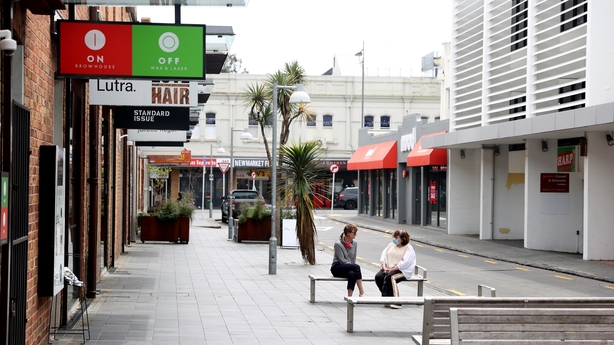New Zealand has unveiled plans to tentatively reopen its borders amid growing pressure from Kiwis stranded overseas by some of the world's toughest pandemic travel restrictions.
Covid-19 Response Minister Chris Hipkins said arrivals from a handful of tiny Pacific island states would be granted quarantine-free travel from next month and other low-risk countries would be considered early next year.
Mr Hipkins also said the 14-day hotel quarantine period currently imposed on all overseas arrivals would be slashed to seven days in November and eventually replaced with home isolation.
He said the border previously acted as the bulwark of New Zealand's virus response but a Delta-variant outbreak in Auckland meant most new cases were now emerging in the community.
"We are also very aware of the pressure that's been building at the border as the world begins to reconnect, and the increasing numbers of New Zealanders here and abroad who want to connect with their loved ones," he said.
New Zealand has recorded just 28 Covid-19 deaths in a population of five million and its residents have enjoyed near-normal domestic life for most of the pandemic.
But border facilities have become increasingly stretched, with tens of thousands of overseas-based New Zealanders clamouring online to book the 4,000 available quarantine rooms.
Local media regularly carry reports of Kiwis unable to visit dying relatives or facing family crises because of the quarantine requirements.
Mr Hipkins said the changes would free up more rooms and the goal was to move towards home isolation in the first three months of 2022, once 90% of New Zealand's population is fully vaccinated.
Read more:
Latest Coronavirus stories
He said no decision had yet been made on whether the home-isolation regime would apply only to returning New Zealanders or also include foreign travellers.

Opposition Covid spokesman Chris Bishop said the plan amounted to a "bare minimum", saying fully vaccinated arrivals from low-risk countries should not have to isolate.
"It's time we reopened to the world. We can't remain shut behind the walls of Fortress New Zealand," he said.
Mr Hipkins said arrivals from Samoa, Tonga, Vanuatu and Tokelau would be quarantine-free from 8 November, mirroring existing arrangements with the Cook Islands and Niue.
He offered no clarification on whether a travel bubble with Australia was likely to reopen.
The bubble opened in April but faced numerous disruptions and was finally suspended in June as multiple outbreaks spread in Australia.
Meanwhile, Australia has eased its Covid-related travel advice for several countries including the United States, Britain and Canada as it prepares to reopen its borders next week for the first time in over 18 months.
Australia will lift its outbound travel ban for fully vaccinated residents from 1 November following a strong uptake of vaccines, as Sydney and Melbourne, its biggest cities, look to welcome overseas travellers without quarantine.
"The changes announced today are a vital next step in reuniting Australian families and safely reopening Australia to the world," Foreign Affairs Minister Marise Payne said in a statement.
The updated country-specific travel advice will also help Australians to access travel insurance more readily, Ms Payne said.
As Australia begins to ease travel curbs, the state of Victoria recorded its deadliest day of the Delta outbreak with 25 deaths and 1,923 cases, the biggest rise in infections in four days.
Despite the Delta wave, national coronavirus numbers are still relatively low by global standards, with about 166,000 cases and 1,694 deaths.
Australia has been gradually easing tough restrictions in Sydney and Melbourne, helped by higher vaccination levels after a third wave of infections fuelled by the highly infectious Delta variant spread rapidly across its southeast.
The relaxation in travel rules, however, is not uniform across Australia, as the country's states and territories have differing vaccination rates and health policies.
Under the updated travel advice framework, the 'do not travel' advisory, put in place for all destinations in March 2020, has been removed. But no destination will be set lower than 'level 2 - exercise a high degree of caution'.

